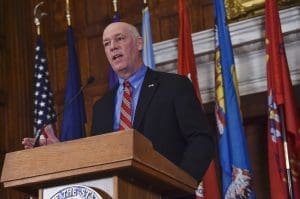Democrats sue over Montana law GOP used to disenfranchise young voters
The lawsuit calls a ban on political activity in college campus buildings a ‘surgical attack’ against youth participation in elections.

Democrats in Montana filed a lawsuit on Tuesday against a law they say is a “surgical attack” on young voters in the state.
The law, S.B. 319, bans political groups from conducting “any voter identification efforts, voter registration drives, signature collection efforts, ballot collection efforts, or voter turnout efforts for a federal, state, local, or school election inside a residence hall, dining facility, or athletic facility operated by a public postsecondary institution.”
The lawsuit says the new ban on political activity is a violation of the First Amendment’s guarantee of the right to free speech and the 26th Amendment’s extension of the franchise to 18-year-olds and guarantee that the right to vote will not be abridged on the basis of age. The suit asks that enforcement of the law be blocked as the suit makes its way through the courts.
Republicans in Montana passed the bill this spring, and GOP Gov. Greg Gianforte signed it into law in May.
GOP lawmakers pushed for the law after youth turnout skyrocketed in the 2020 presidential election. A study conducted by researchers at Tufts University found an 11% increase in voter turnout in the 18-29 age demographic.
Nationally, that same age demographic voted for Joe Biden over Donald Trump by a margin of 65% to 31%, according to exit poll data.
The lawsuit, filed by the Montana Democratic Party, the campaign of Montana Democratic Sen. Jon Tester, and Macee Patritti, a 19-year-old freshman at the University of Montana, says the law was passed specifically to limit voting by young people.
“Rather than celebrate this laudable increase in youth participation, the Montana Legislature chose instead to pass a suite of voter suppression laws targeting young voters and limiting their access to the franchise,” the lawsuit states.
The lawsuit charges that the law is “a surgical attack on the successful organizing efforts and increased political power of Montana’s youngest voters. By targeting only university residence halls, dining facilities, and athletic facilities, the Legislature made clear its intent: preventing young, newly enfranchised Montanans from participating fully in the political process.”
This law was one of a number of changes Republicans in Montana and in other states enacted after the 2020 election to make it harder to vote, after Trump lied about the election being stolen from him and demanded that Republicans change the laws to make it more difficult to cast ballots in future elections.
Trump carried Montana in 2020 with 57% of the vote, an increase over the 56.5% he received four years earlier.
Still, in April, Montana’s newly elected Gov. Gianforte signed a law that makes it harder to vote in the state by ending same-day voter registration and a law that requires students to provide additional ID if they used a student ID to register to vote. The Montana Democratic Party sued in a Montana district court to block that change.
Montana is one of the five states that gained a House seat in the 2021 redistricting process — the others are Oregon, Florida, North Carolina, and Colorado, while Texas gained two — and the youth vote could be a huge factor in which party wins that new seat.
Missoula, home to the University of Montana and potentially located in the new district, which will be drawn up in November, is more Democratic and could put a second U.S. House seat in the state up for grabs.
Montana isn’t the only GOP-controlled state that has tried to hamper young-voter participation.
This spring, New Hampshire Republicans introduced two bills targeted against college student turnout, one that would have banned students using dorm addresses to register to vote and another that removed student IDs from the list of forms of identification acceptable to vote. Neither bill passed.
In July, the New Hampshire Supreme Court struck down a law Republicans in the state passed in 2017 that created extra obstacles for college students trying to register, saying it imposed “an unreasonable and discriminatory burden on the rights of voters in New Hampshire.”
Published with permission of The American Independent Foundation.
Recommended

Alaska House committee advances, expands proposal to bar trans girls from girls sports
Amended bill would add elementary, middle school and collegiate sports to limits in place for high school
By Claire Stremple, Alaska Beacon - April 16, 2024
Senate clears gallery, passes bill to arm Tennessee teachers
Covenant parents emotional in wake of vote
By Sam Stockard, Tennessee Lookout - April 10, 2024
Not if, but when: Parents of slain Parkland students urge Utah lawmakers to pass school safety bill
The parents of children killed in the 2018 Marjory Stoneman Douglas High School shooting have a stark warning for Utah lawmakers: “It’s not a matter of if, it’s a matter of when and where the next school shooting will happen.”
By Kyle Dunphey, Utah News Dispatch - February 21, 2024









































































